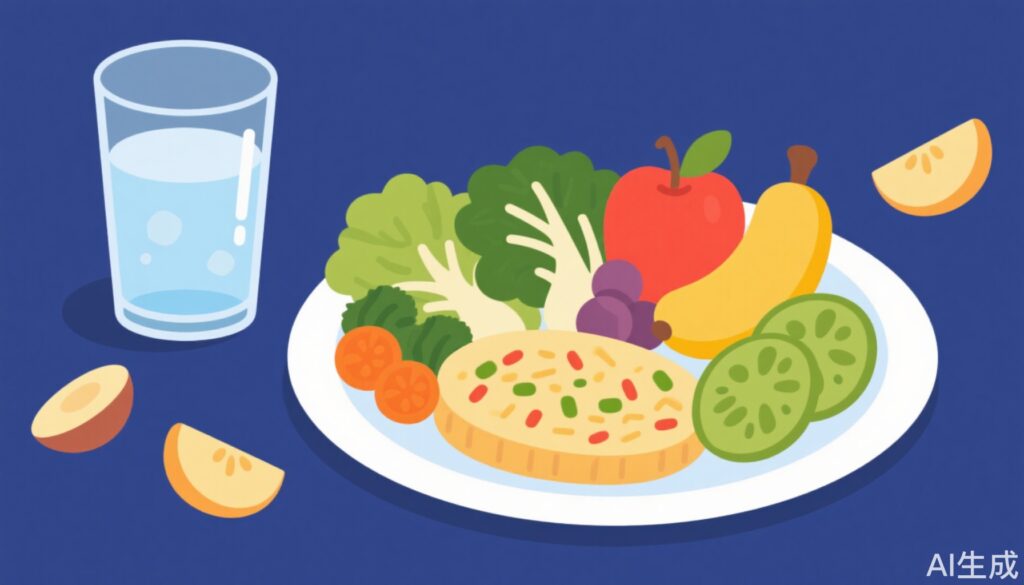Introduction
Gout is a form of arthritis caused by the accumulation of uric acid crystals in joints, leading to painful inflammation. Proper dietary management is crucial for controlling symptoms and preventing flare-ups. This article provides comprehensive guidance on how to eat healthily if you have gout, focusing on purine intake, hydration, and nutrient balance.
Dietary Principles
Control Purine Intake: Purines are substances that break down into uric acid in the body. Patients with gout should strictly limit purine-rich foods. During acute attacks, consume foods low in purines; during remission phases, you may relax restrictions moderately but avoid excessive intake of high-purine foods.
Reduce Caloric Intake: Many people with gout are overweight or obese, which can worsen symptoms. Gradual calorie reduction helps achieve and maintain a healthy weight, but avoid extreme dieting as it can disrupt uric acid metabolism.
Increase Hydration: Drinking plenty of water increases urine output and helps flush uric acid from the body, lowering blood uric acid levels and reducing the risk of kidney stones. Aim for 2,000–3,000 ml daily, preferably water or light tea.
Limit Alcohol Consumption: Alcohol, especially beer and spirits, promotes lactic acid buildup, which impairs uric acid excretion and exacerbates gout. Complete abstinence from alcohol is recommended; moderate red wine intake may be acceptable but should not be excessive.
Choose Appropriate Protein Sources: Opt for low-fat, low-purine proteins like milk, eggs, and tofu. Avoid high-purine meats and seafood. Protein should constitute about 10%–20% of total caloric intake.
Increase Vitamin C Intake: Vitamin C facilitates uric acid dissolution and excretion. Incorporate fruits and vegetables rich in vitamin C such as oranges, lemons, strawberries, cherries, broccoli, and spinach to help reduce uric acid levels and prevent attacks.
Choosing Foods Based on Purine Content
Low-Purine Foods (Less than 25 mg purine per 100g): Safe for gout patients. Include cereals like rice, millet, corn, oats, noodles, pasta, and bread; tubers like potatoes, sweet potatoes, and cassava; most vegetables (cucumber, eggplant, tomato, cabbage, celery, carrots, pumpkins, bitter melon, lettuce, onions, peppers, bean sprouts, lotus root); fruits such as apples, pears, bananas, oranges, lemons, strawberries, cherries, watermelon, peaches, apricots, coconuts, grapes; dairy products like milk, goat milk, cheese, yogurt, and eggs; and animal blood products like pig, cow, chicken, duck, and goose blood.
Moderate-Purine Foods (25–150 mg purine per 100g): Can be consumed in moderation during stable periods. Avoid during flare-ups. Includes poultry and livestock meats (chicken, duck, goose, turkey, pork, beef, lamb); fish (grass carp, carp, crucian carp, silver carp, tilapia, flatfish, cod, eel); shellfish (abalone, clam, lobster, crab, sea cucumber, jellyfish); and some vegetables (spinach, chives, peas, beans, lentils, green beans).
High-Purine Foods (150–1000 mg purine per 100g): Strictly avoid. Includes organ meats (liver, kidneys, heart, brain, intestines); certain seafood (sardines, anchovies, small shrimp, oysters, clams, scallops, ribbonfish, yellow croaker, bass, cod, eel); some meats like lamb leg and rabbit; and concentrated meat broths, hot pot soup, and yeast extracts.
Specific Food Recommendations
Vegetables: Emphasize leafy greens (spinach, lettuce, celery leaves), gourds (cucumber, zucchini, pumpkin), and nightshades (tomato, eggplant, green pepper). These provide vitamins, minerals, antioxidants, and have low purine content, supporting health and reducing inflammation.
Fruits: Favor cherries, strawberries, blueberries, apples, pears, bananas, kiwifruit, oranges, and lemons. Cherries are rich in anthocyanins and vitamin C, offering anti-inflammatory and antioxidant benefits and promoting uric acid excretion. Regular cherry consumption may lower gout flare risk. Berries similarly provide antioxidant protection, while other fruits supply essential vitamins and help regulate acid-base balance and immunity.
Main Carbohydrates: Include rice, millet, corn, oats, buckwheat, and tubers like potatoes, sweet potatoes, and yam. These foods are energy-rich with low purine content and provide dietary fiber, vitamins A and C, and potassium, which support gut health and uric acid elimination.
Protein Sources: Milk, eggs, and tofu are preferred choices for gout patients, offering high-quality protein with minimal purine content.
Additional Considerations
Besides diet, regular physical activity and maintaining a healthy weight are important for gout management. Avoid rapid weight loss as it can increase uric acid levels. Always consult healthcare providers before making significant dietary changes or starting supplements.
Medications such as urate-lowering therapies and anti-inflammatory agents are essential for many gout patients and should be used as prescribed by a physician. Dietary measures complement but do not replace medical treatment.
Conclusion
Managing gout through diet involves controlling purine intake, staying hydrated, moderating caloric and alcohol consumption, and choosing nutrient-rich foods that support uric acid excretion and overall health. Adopting these dietary habits can reduce the frequency and severity of gout attacks and improve quality of life.


